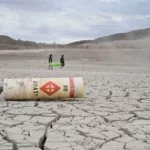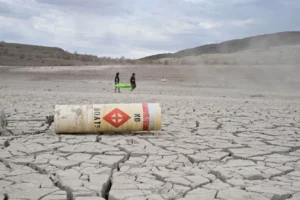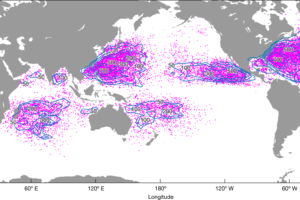Something remarkable happened on NBC television stations the other day. NBC local affiliates across the country aired a story that explicitly named the climate emergency as a scientific reality, not just an activist demand. And from that foundation, Chase Cain, a national climate reporter for the NBC Owned Television Station Group, then explored what government officials — specifically, US president Joe Biden — might do about that emergency.
As news organizations ramp up their 2024 election coverage, in the US and elsewhere, this NBC piece is a salutary reminder that we should ground our reporting in the actual facts of the situation, not in what big name candidates, political insiders, voting blocs, and other partisan interests acknowledge the facts to be.
Climate change is, fundamentally, a science story. Many news organizations have instead treated it primarily as a politics story. But what politics says about climate change is secondary; the laws of physics do not compromise or care whether politicians believe in them. Giving the politics side of the story precedence over the science side is the tail wagging the dog; it leads to coverage that often misses the point, fails to convey the full truth of the situation, and thus leaves the public misinformed.
In a briskly told 2 minutes 8 seconds, Cain’s NBC piece shows how easy it is to do better. The piece opens conventionally with interviews of young protesters at September 17’s March to End Fossil Fuels in New York who say they’re scared for their future and want US president Joe Biden to declare a climate emergency.
The key pivot comes 35 seconds in, when Cain, in a stand-up, makes it clear that it’s not only activists who call climate change an emergency: It is scientists, thousands of them. Cain holds up a copy of a peer-reviewed article signed by more than 11,000 scientists who, he reports, agree “clearly and unequivocally that planet Earth is facing a climate emergency” as those same words appear on the screen.
The rest of the piece summarizes how the Biden administration is responding, including the president’s claim in August that he had “practically” declared a climate emergency, a statement Cain quickly counters: “But he actually hasn’t.” The strength of the piece is that these political responses are reported in a context where the climate emergency has already been stated as a scientific fact, one whose handling could affect Biden’s re-election chances.
Left unmentioned — and thus a good opportunity for follow-up coverage — is how the climate views of Biden’s Republican opponents might affect their electoral chances. Cain did report that 57% of Americans favor declaring a climate emergency. But none of the declared Republican presidential candidates accepts that human-caused climate change even exists, much less that it qualifies as an emergency. As soaring global temperatures smashed yet another heat record in September, which one scientist characterized as “gobsmackingly bananas,” will these and other Republican candidates pay a price in 2024 for their refusal to acknowledge climate reality?
That’s a story waiting to be reported, and not only by climate specialists like Cain. Political reporters, take note: Climate change is a 2024 campaign story. Ground your coverage in what science says: Humanity faces an emergency that requires rapidly phasing out oil, gas, and coal. Voters deserve to know what their elected representatives will do about that emergency.
Source : Covering Climate Now











Add Comment